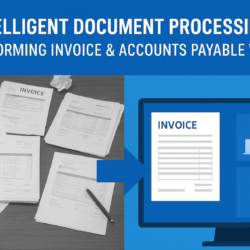Finance leaders are under immense pressure to do more with less, CFOs must maintain cash flow, improve efficiency, and ensure compliance all while managing leaner teams and tighter budgets. As organizations embrace automation across functions, the Accounts Payable (AP) process remains one of the most valuable areas for transformation.
That’s where an Accounts Payable AI Agent steps in not as a tool, but as an intelligent assistant that learns, adapts, and optimizes AP operations from end to end. As we approach 2026, forward-thinking CFOs are realizing that integrating AI into AP isn’t optional anymore it’s essential to stay competitive.
The Shifting Role of the CFO
Over the past few years, the CFO’s role has evolved from financial gatekeeper to strategic leader. Modern CFOs are expected to deliver insights, drive operational agility, and forecast financial outcomes with precision. However, many still spend a large portion of their time on manual and transactional work particularly in AP.
Traditional accounts payable teams spend countless hours on invoice entry, matching, verification, and payment approvals. Errors creep in, approvals are delayed, and duplicate payments slip through. These inefficiencies not only cost time but also lead to late fees, strained vendor relationships, and cash flow disruptions.
AI Agent eliminates these pain points by automating data capture, validating invoices in real-time, and learning from historical payment patterns to optimize every step of the AP cycle.
Understanding the Accounts Payable AI Agent
AI Agent is an intelligent automation system designed to handle invoice processing, vendor management, and payment workflows using artificial intelligence. Unlike traditional automation tools that follow rigid rules, AI agents use machine learning (ML) and natural language processing (NLP) to understand documents, detect anomalies, and make contextual decisions.
Here’s how it works:
-
Invoice Capture: The AI Agent reads invoices from emails, PDFs, or scanned images using OCR and NLP.
-
Data Validation: It matches invoice details against purchase orders, receipts, and vendor master data.
-
Error Detection: The agent identifies inconsistencies, duplicate invoices, and suspicious entries before submission.
-
Approval Routing: Based on company policies and user roles, it automatically sends invoices for approval.
-
Payment Optimization: It learns from payment cycles to predict cash flow and suggest early-payment discounts.
This end-to-end automation transforms a traditionally manual process into a streamlined, intelligent workflow that enhances accuracy and reduces operational costs.
Why CFOs Can’t Ignore AI in AP Any Longer
1. Eliminating Costly Inefficiencies
Manual AP processes can cost up to $10–15 per invoice, depending on the complexity of verification and approval. With an AI Agent, that cost drops dramatically often below $2 per invoice by reducing labor hours and error corrections.
The savings don’t stop there. By detecting duplicate or fraudulent invoices before payment, the AI agent helps avoid financial leakage, ensuring every dollar is accounted for.
2. Improving Accuracy and Compliance
Accuracy in accounts payable isn’t just about numbers it’s about governance. The AI Agent ensures that all invoices comply with company policies, tax rules, and regulatory frameworks. It can automatically flag non-compliant entries or missing data points, helping CFOs maintain audit readiness at all times.
Moreover, because the agent learns continuously, it adapts to new compliance rules, vendor formats, and payment methods without requiring manual updates.
3. Enhancing Cash Flow Visibility
One of the biggest challenges CFOs face is managing working capital efficiently. AI-driven AP systems provide real-time visibility into payables, due dates, and outstanding balances.
With predictive analytics, the Accounts Payable AI Agent can forecast future liabilities and recommend the best payment timing to maximize discounts or improve cash reserves. This level of financial intelligence empowers CFOs to make data-backed decisions that directly impact profitability.
4. Boosting Team Productivity
An intelligent AI Agent doesn’t replace your AP team it empowers them. By handling repetitive tasks like invoice entry and reconciliation, it allows finance professionals to focus on value-added activities such as vendor negotiations, forecasting, and reporting.
This shift not only improves morale but also reduces burnout and turnover two major concerns in finance departments facing increasing workloads.
5. Ensuring Scalability and Adaptability
As organizations expand globally, AP departments must deal with multiple currencies, tax jurisdictions, and varying vendor requirements. An AI Agent scales effortlessly with the business, supporting multilingual document processing and region-specific compliance rules.
Whether your company processes 1,000 or 100,000 invoices per month, the AI Agent maintains consistent performance and accuracy something manual teams can’t sustain.
6. Reducing Risk of Fraud
According to the Association for Financial Professionals (AFP), over 65% of companies experienced attempted or actual payment fraud in the past year. AI Agents play a critical role in detecting anomalies that could indicate fraud.
By continuously learning normal transaction behavior, they flag irregularities such as mismatched vendor details or unusual payment requests before they escalate into losses.
Real-World Impact: From Reactive to Predictive Finance
Organizations that have implemented AI Agents report transformational results:
-
70-80% reduction in manual invoice handling time
-
25-40% cost savings in AP operations
-
50% faster cycle times for invoice approvals
-
Near 100% accuracy in data extraction and validation
Beyond these metrics, CFOs gain a strategic advantage the ability to shift from reactive financial management to predictive, insight-driven decision-making.
Preparing for 2026: The Strategic Edge
As we move toward 2026, finance functions will become more autonomous, data-driven, and AI-enabled. The organizations that thrive will be those that invest in intelligent automation today.
CFOs who adopt AI Agents position their companies to:
-
Operate with leaner finance teams without sacrificing quality.
-
Improve supplier relationships through faster, error-free payments.
-
Ensure full audit readiness and compliance.
-
Make smarter working capital decisions backed by real-time data.
Waiting until 2026 means falling behind competitors who are already realizing these advantages.
Final Thoughts
The era of manual invoice management and reactive financial operations is ending. As businesses enter 2026, CFOs must lead the charge toward intelligent automation and the Accounts Payable AI Agent is a critical first step.
It’s not just about efficiency; it’s about control, insight, and strategy. By embracing AI in AP, CFOs can unlock hidden savings, improve cash flow predictability, and create a more agile financial ecosystem ready for the future.
The question isn’t if your finance team should adopt an AI Agent it’s when. And for those preparing to lead in 2026, the answer is clear the time is now.




